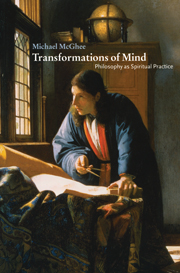Book contents
- Frontmatter
- Contents
- Acknowledgements
- Introduction
- 1 ‘A philosophy that is not a philosophy’
- 2 Contrary states
- 3 ‘… you hear the grating roar’
- 4 The energy for war
- 5 The division of the soul
- 6 ‘Wandering between two worlds …’
- 7 Kant's aesthetic ideas
- 8 … And his rational ones
- 9 Arnold's recast religion
- 10 Theism, non-theism and Haldane's Fork
- 11 Erotic reformations
- 12 A language of grasping and non-grasping
- 13 ‘… sinne/ like clouds ecclips'd my mind’
- 14 Concentration, continence and arousal
- 15 Uneasily, he retraces his steps …
- References
- Index
3 - ‘… you hear the grating roar’
Published online by Cambridge University Press: 07 December 2009
- Frontmatter
- Contents
- Acknowledgements
- Introduction
- 1 ‘A philosophy that is not a philosophy’
- 2 Contrary states
- 3 ‘… you hear the grating roar’
- 4 The energy for war
- 5 The division of the soul
- 6 ‘Wandering between two worlds …’
- 7 Kant's aesthetic ideas
- 8 … And his rational ones
- 9 Arnold's recast religion
- 10 Theism, non-theism and Haldane's Fork
- 11 Erotic reformations
- 12 A language of grasping and non-grasping
- 13 ‘… sinne/ like clouds ecclips'd my mind’
- 14 Concentration, continence and arousal
- 15 Uneasily, he retraces his steps …
- References
- Index
Summary
Matthew Arnold's now neglected Literature and Dogma of 1873 was a sensitive, intelligent response to the new spirit of positivism and the growing acknowledgement of the Death of God. He manages at once to embrace the positivist critique of theology and to illuminate religion by means of its experimental method. We can see in the progress of his poetry and his theological writing the felt processes of the loss of faith and the spirituality of his response to it.
What emerges from his reflections is the experiential notion of a revelatory life freed from the traditional dogma he had come to reject. I want to explore the gradual formation of this notion, with the aid of some key Buddhist concepts that help, I think, to highlight Arnold's essentially non-theistic thinking, the development of which bears comparison with Tanabe's ‘metanoetics’. We start with the bleakness of Dover Beach, which is where most religious commentators remain, but then move by degrees into mature religious writing in which something like a phenomenology of jiriki and tariki emerges. We start in fact with a cultural disappointment and sense of nihilism, the Death of God, the painful dismantling of traditional dogmatic structures which were perceived at least to be entirely discredited by serious and honest thinkers. It is an historic moment in which the most strenuous efforts of jiriki leave us desolate. The self-power I refer to here is the intellectual effort of traditional metaphysics and natural theology, as well as their critical subversion. It is this whole dialectic that Tanabe presumably has in mind as the contrast when he refers to his ‘philosophy that is not a philosophy’.
- Type
- Chapter
- Information
- Transformations of MindPhilosophy as Spiritual Practice, pp. 39 - 62Publisher: Cambridge University PressPrint publication year: 2000



